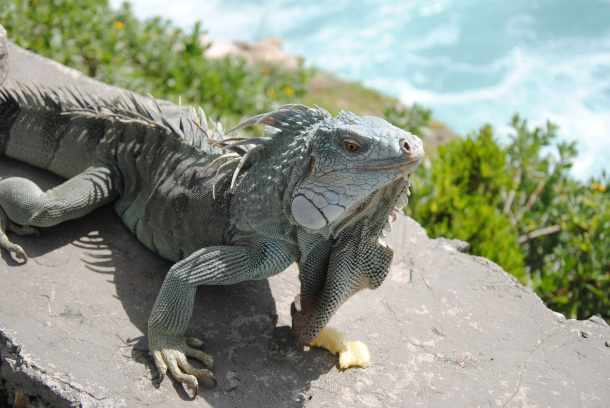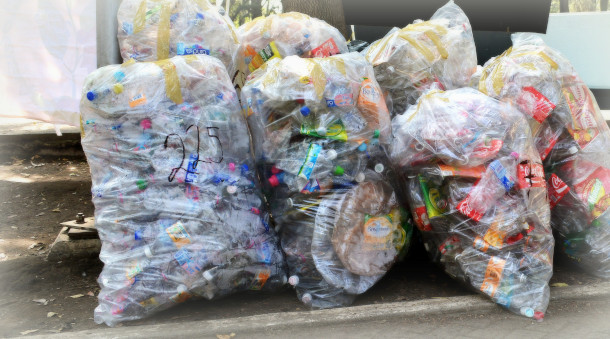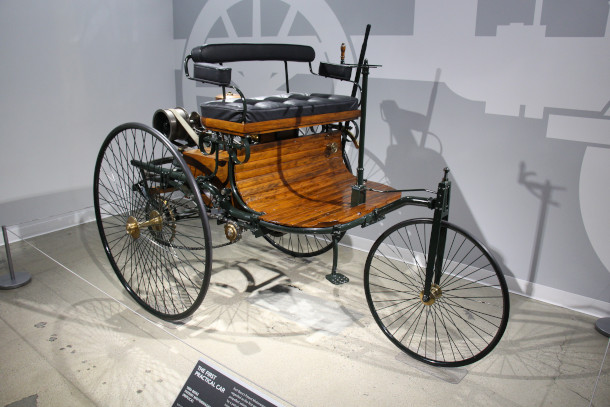Beyond the Headlines With Peter Dykstra
Air Date: Week of January 27, 2023

Fewer iguanas are falling from trees in Florida during the cold due to climbing global temperatures from climate change and a shift in cold hardiness in the lizards. (Photo: Steve Singer, Flickr, CC BY-ND 2.0)
Journalist Peter Dykstra joins host Steve Curwood to discuss why fewer iguanas are falling in Florida during cold snaps. They also consider if England's recent ban on some single-use plastics set to take effect in October will stem the accumulation of disposable plastic. For a history lesson, they dive into Karl Benz's 1886 patent for a three-wheeled, chain-driven, gasoline-powered horseless carriage he obtained with financial and design help from his wife Bertha.
Transcript
CURWOOD: On the line now from Atlanta, Georgia is living on Earth commentator, Peter Dykstra. Hi there Peter, what do you have for us today?
DYKSTRA: Well, hi, Steve. You know, sometimes people use that old phrase, it's raining cats and dogs. But in Florida in recent years, it's been iguanas falling from the sky. When Florida has one of its occasional cold snaps, the reptiles literally freeze in the trees, and eventually just tip over, hit the ground or maybe even hit somebody upside the head.
CURWOOD: Well, of course, they are cold blooded lizards. So there you go. But when they're big, that must be quite a risk.
DYKSTRA: They're an invasive species, they can do some damage. If they're healthy and unfrozen. Iguanas can carry bacteria like Salmonella, they can eat plants and even small animals and they're digging and running can cause damage to sea walls and canal banks. Of course, Burmese pythons are an even bigger fright, to the extent that they've disrupted the ecosystem of the Everglades.
CURWOOD: So cold weather would usually knock back the iguanas and a big snake like a Python. But apparently these critters are adapting to our changing climate.
DYKSTRA: There's been some recent research to suggest that the iguanas are actually adapting to the colder weather they're not used to in the tropics, and that they are freezing and falling less often.
CURWOOD: Boy, well, you know, climate disruption, I guess the animals are adapting, adapt or perish. Ah, what else do you have for us?

Starting in October, England will ban single-use plastic plates, trays, bowls, cutlery and some polystyrene cups and food containers. (Photo: Carl Campbell, Flickr, CC BY-SA 2.0)
DYKSTRA: Starting in October, England is going to ban some single use plastic products, plates, trays, bowls, forks and spoons and knives, polystyrene cups food containers. This is England, mind you, it's not all of the United Kingdom. There's a huge volume as there is in any developed country of plastic were used and immediately thrown away. Only 10% of all those plastic products are ever recycled. England has already banned plastic straws and some other things a few years ago, but they're still behind Scotland and Wales. They're behind the rest of the EU, which of course they're no longer a member of the European Union. They are ahead of course of the United States which has done little or nothing.
CURWOOD: That's right, Peter, there are some towns that have banned the use of plastic bags. I think even entire states have like Maine, but the United States No, I remember being in London just before the pandemic really hit and surprise surprise already the straws and drink stirrers had had gone away and people were lamenting it. This has stirred up some controversy I suppose that England is so far behind.
DYKSTRA: People are tough to adapt, and of course in this country an added factor is that the oil and gas industry remember all those plastic things come from petrochemicals are viewing plastics as a possible safety valve for the industry, as climate concerns may continue to cut back the use of fossil fuels to drive our vehicles, heat our homes, any other uses. Plastics can be another way for the petrochemical industry, the oil and gas industry to stay alive. And even at that they're a contributor in their own right to climate change.

On January 29, 1886, German engineer Karl Benz applied for a patent for a three-wheeled, chain-driven, gasoline powered horseless carriage. (Photo: Cars Down Under, CC BY 2.0)
CURWOOD: That's right. Hey, what do you have from the vaults of history this week, Peter.
DYKSTRA: January 29 1886, a German engineer with a name that lives on today, Karl Benz applied for the first three patents for a three wheeled chain driven gasoline powered horseless carriage, sort of a precursor to the modern automobile. He had all three patents granted, the Benz company grew in the early 20th century, they merged with a rival company, Mercedes, and that brand name lives on today. And it's pretty costly.
CURWOOD: And actually one of the most important stories about Carl Benz is his wife, Bertha Benz. She not only made it financially possible for him to do this, but also invented some of the components gearing systems so that new horseless carriage with three wheels could climb hills, and also brake pads so you could slow the thing down.
DYKSTRA: I'll have to take your word for it, Steve. I was too young to have been there.
CURWOOD: Okay. Peter Dykstra is a living on Earth commentator. Thanks so much, Peter. We'll talk to you again real soon.
DYKSTRA: All right, Steve. Thanks a lot. Talk to you soon.
CURWOOD: And there's more on these stories on the Living on Earth webpage. That's LOE.org.
Links
WeatherBug | “Florida Seeing Fewer Falling Iguanas as Reptiles Adapt to the Cold”
The New York Times | “England Is Banning Some Single-Use Plastics. Activists Say It’s a Small Step”
Living on Earth wants to hear from you!
Living on Earth
62 Calef Highway, Suite 212
Lee, NH 03861
Telephone: 617-287-4121
E-mail: comments@loe.org
Newsletter [Click here]
Donate to Living on Earth!
Living on Earth is an independent media program and relies entirely on contributions from listeners and institutions supporting public service. Please donate now to preserve an independent environmental voice.
NewsletterLiving on Earth offers a weekly delivery of the show's rundown to your mailbox. Sign up for our newsletter today!
 Sailors For The Sea: Be the change you want to sea.
Sailors For The Sea: Be the change you want to sea.
 The Grantham Foundation for the Protection of the Environment: Committed to protecting and improving the health of the global environment.
The Grantham Foundation for the Protection of the Environment: Committed to protecting and improving the health of the global environment.
 Contribute to Living on Earth and receive, as our gift to you, an archival print of one of Mark Seth Lender's extraordinary wildlife photographs. Follow the link to see Mark's current collection of photographs.
Contribute to Living on Earth and receive, as our gift to you, an archival print of one of Mark Seth Lender's extraordinary wildlife photographs. Follow the link to see Mark's current collection of photographs.
 Buy a signed copy of Mark Seth Lender's book Smeagull the Seagull & support Living on Earth
Buy a signed copy of Mark Seth Lender's book Smeagull the Seagull & support Living on Earth

